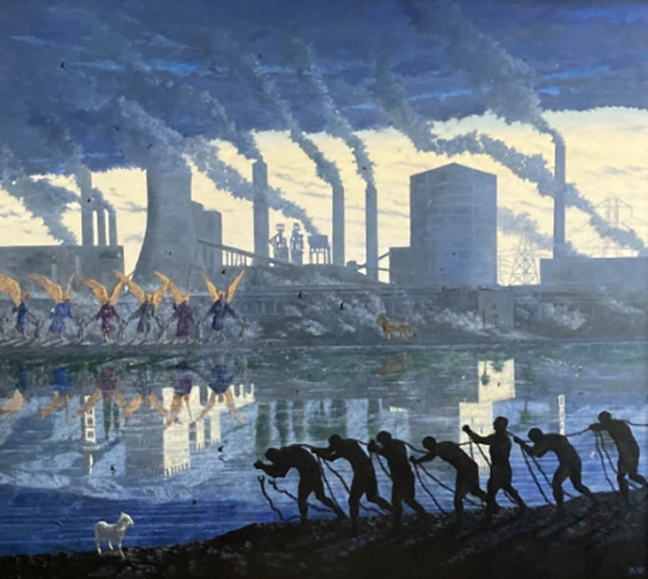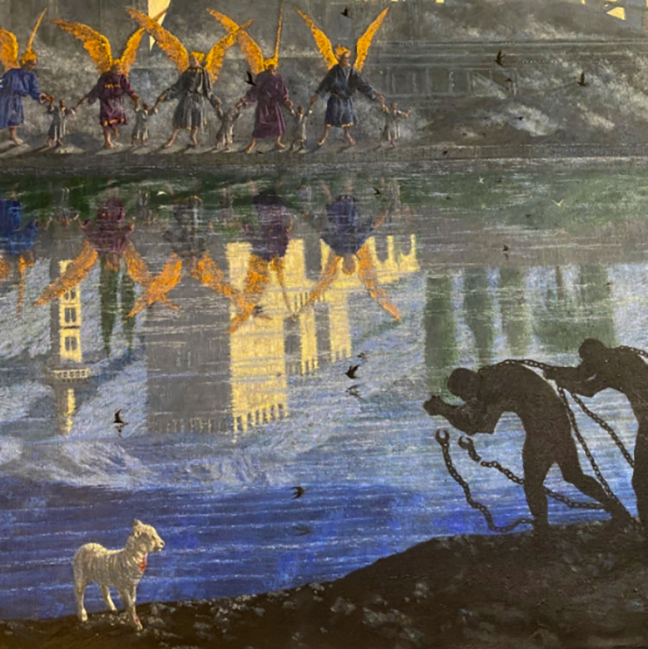March 13: Law vs. Grace: Do All the the Glory of God
♫ Music:
Day 29 - Wednesday, March 13
Title: LAW VS. GRACE: DO ALL TO THE GLORY OF GOD
Scripture #1: Galatians 5:1 (NKJV)
Stand fast therefore in the liberty by which Christ has made us free, and do not be entangled again with a yoke of bondage.
Scripture #2: 1 Corinthians 10:23-33 (NKJV)
All things are lawful for me, but not all things are helpful; all things are lawful for me, but not all things edify. Let no one seek his own, but each one the other’s well-being. Eat whatever is sold in the meat market, asking no questions for conscience’ sake; for “the earth is the Lord’s, and all its fullness.” If any of those who do not believe invites you to dinner, and you desire to go, eat whatever is set before you, asking no question for conscience’ sake. But if anyone says to you, “This was offered to idols,” do not eat it for the sake of the one who told you, and for conscience’ sake; for “the earth is the Lord’s, and all its fullness.” “Conscience,” I say, not your own, but that of the other. For why is my liberty judged by another man’s conscience? But if I partake with thanks, why am I evil spoken of for the food over which I give thanks? Therefore, whether you eat or drink, or whatever you do, do all to the glory of God. Give no offense, either to the Jews or to the Greeks or to the church of God, just as I also please all men in all things, not seeking my own profit, but the profit of many, that they may be saved.
Poetry & Poet:
“Sacred Allegory”
by Roger Wagner
I travelled roads from east to west
And passed a mighty city where
A thousand arc lights lit the ground
And smoking chimneys choked the air.
I saw there in a prophecy
As an unending city state
An empire that engulfed the world
Its name was Babylon the great.
In that great city no birds sing
And in its streets no seed can flower
There steel and concrete have one theme
Whose only currency is power.
There none no what they serve or why
Or with their choices what they choose
But each choice is a zero sum
Where if I win then you must lose.
And that iron law twists every choice
And binds each soul with chains of iron
Its walls of iron ring every land
And seal off every road to Zion.
But standing there upon a shore
I thought I saw the lamb of God
A sacrifice already slain
With whitest wool stained red with blood.
And as I saw that powerless lamb
Had suffered all that power could do
A breath of life breathed though the land
By which the whole world was made new.
As with forgiveness , mercy grace
The math of zero sum unwound
From wretched captives, naked, blind
The chains of iron fell to the ground.
Not iron but angels held their hand
As stepping by a crystal sea
Within a figured dance they find
An order in which all are free.
Then all equations were reversed
The lamb of God became a lion
The walls of iron were broken down
And pilgrims thronged the paths of Zion
And mirrored in that crystal sea
I saw the new Jerusalem
Its walls and trees and shining towers
Both here and now and still to come.
DO ALL TO THE GLORY OF GOD
It is our natural tendency as humans to presume that we already understand something. We already know how to put together that bookcase (without directions) or make that cake (without a recipe). We can read notable passages of Scripture like the two presented to us today and assume that we already understand them. Do we actually understand how the good news of Christ turns these common words or phrases “upside down” into new realities?
Galatians 5:1 reminds us that we have liberty in Christ, and that Christ has made us free. Our minds may provide our own understanding of liberty and what it means to be free. But our second passage today, 1 Corinthians 10-23-33, helps us understand these concepts in the light of Christ’s gospel. In this passage, Paul instructs us that lawfulness, liberty, and conscience are all viewed through the lenses of serving each other for the glory of the Lord. Paul uses the culminating “therefore” to introduce us to his conclusion: “therefore, whether you eat or drink, or whatever you do, do all to the glory of God.” (v. 31)
While we grapple with the knowledge that we are free in Christ, we are reminded that the point of that freedom is not to see our own profit, but to see the profit of many so they may be saved. (v. 33) The gospel of Christ calls us to love God with all that we are and to love others as ourselves. (Matthew 22:36-40) It is far too easy to assume we already understand what this means. A life lived out to the glory of God requires continual prayer and reflection on the gospel of Christ.
Roger Wagner’s poem highlights the fractious nature of lives unsubmitted to Christ, where “each choice is a zero sum / where if I win then you must lose.” Wagner highlights the glorious, good news of the death of Jesus, the Lamb of God, “by which the whole world was made new / as with forgiveness, mercy grace / the math of zero sum unwound.” Today’s art, also by Wagner, provides us with a visual reminder that the Lord will one day usher in a new heaven and a new earth.
Prayer
Today’s music selection, with words by Thomas Merton & music by Kate Campbell, will be our prayer:
My Lord God, I have no idea where I am going
I do not see the road ahead of me
I cannot know for certain where it will end
Nor do I really know myself
And the fact that I think that I am following your will
Does not mean that I am actually doing so
But I believe that the desire to please you
Does in fact please you
And I hope I have that desire in all that I am doing
I hope that I will never do anything apart from that desire
And I know that if I do this
You will lead me by the right road
Though I may know nothing about it
Therefore will I trust you always
Though I may seem to be lost and in the shadow of death
I will not fear for you are ever with me
And you will never leave me to face my perils alone
Amen
Stacie Schmidt
Law Librarian
For more information about the artwork, music, and poetry selected for this day, we have provided resources under the “About” tab located next to the “Devotional” tab.
About the Art:
Sacred Allegory (Includes a close-up)
Roger Wagner
2023
Oil on canvas
About the Artist/Poet:
Roger Wagner (b. 1957) is a British artist and poet. Wagner studied English at Oxford University before studying at the Royal Academy School of Art. He has been represented in London since 1985 by Anthony Mould Ltd., exhibiting in the city many times. Other one-man shows include retrospectives at the Ashmolean Museum in 1994 and 2010. He has produced several books of illustrated poems and translations, including Fire Sonnets (1984), In a Strange Land (1988), A Silent Voice (1997), Out of the Whirlwind (1997), and The Book of Praises—a translation of the psalms produced as Book One (1994), Book Two (2008), and Book Three (2013). His major work Menorah was acquired by the Ashmolean Museum in 2010, and currently hangs in St. Giles Church in Oxford. In 2019, Canterbury Press published a collection of Wagner’s poems and images entitled The Nearer You Stand. In Wagner’s work, several themes emerge: the Renaissance, the English landscape, poetry, and Christian meditation. Wagner’s paintings possess a sense of stillness at the center of the storm, a confirmation that there is hope in the face of despair. Wagner is not afraid to grapple with issues of judgment and suffering in his work, but his theology is always rooted in the all-sufficient love of God. Today’s poem may be found in Wagner’s book of poetry and art entitled The Nearer You Stand: Poems and Images.
http://www.rogerwagner.co.uk/profile
https://imagejournal.org/artist/roger-wagner/
About the Music:
“Prayer of Thomas Merton” from the album For the Living of These Days
Lyrics:
My Lord God,
I have no idea
Where I’m going.
I do not see the road ahead of me.
I can not know for certain where it will end,
Nor do I really know myself.
And the fact that I think I am following your will,
Does not mean that I am actually doing so.
But I believe that the desire to please you,
Does in fact please you.
And I hope that I have that desire,
In all that I am doing.
I hope that I will never do,
Anything apart from that desire.
And I know that if I do this,
You will lead me by the right road.
Though I may know nothing about it,
Therefore, I will trust you always.
Though I may seem to be lost,
Amid the shadow of death.
For I will not fear for you are ever with me,
And you will never leave me,
To face my perils alone.
About the Composer:
Lyrics from Thomas Merton’s book Thoughts in Solitude
Music by Kate Campbell
Thomas Merton (1915–1968) was a Roman Catholic monk, poet, and prolific writer on spiritual and social themes and one of the most important American Roman Catholic writers of the twentieth century. After a year at the University of Cambridge, he entered Columbia University, where he earned both B.A. and M.A. degrees. Following years of agnosticism, he converted to Catholicism and entered the Trappist Abbey of Gethsemani in Kentucky. The Trappists are considered to be one of the most ascetic of the Roman Catholic monastic orders and it was there that Merton grew as a mystic, pursuing spiritual quests through his writing. Merton’s first published works were collections of poems: Thirty Poems (1944), A Man in the Divided Sea (1946), and Figures for an Apocalypse (1948). With the publication of the autobiographical Seven Storey Mountain (1948), he gained an international reputation. His early works are strictly spiritual, but his writings of the early 1960s tend toward social criticism, civil rights, pacifism, and nonviolence.
https://www.britannica.com/biography/Thomas-Merton
About the Performer:
Kate Campbell, daughter of a Baptist preacher, is an American singer-songwriter who writes and sings folk songs infused with undercurrents of delta blues, folk, pop, and country. Over the course of twenty-plus years since her acclaimed debut album Songs from the Levee, she has resisted the temptation to follow musical trends and instead chooses to set the pace for her unique musical journey. Campbell’s clear-water vocal delivery and her eloquent gift for storytelling have drawn repeated comparisons to Southern literary traditionalists such as Flannery O’Connor, Eudora Welty, and William Faulkner. Kate’s formative years were spent in the very core of the Civil Rights Movement of the 1960s. Campbell has performed at a number of esteemed venues such as the Cambridge Folk Festival, Philadelphia Folk Festival, Port Fairy Folk Festival, and the National Storytelling Festival, and been featured on NPR’s Morning Edition, All Things Considered, Live from Mountain Stage, and The Bob Edwards Show.
http://www.katecampbell.com/
About the Devotion Writer:
Stacie Schmidt
Law Librarian
Stacie Schmidt is a law librarian. She loves solving difficult research questions, finding the best hole-in-the-wall restaurants, and dialoguing about film. Her favorite book of the Bible is Hebrews.

